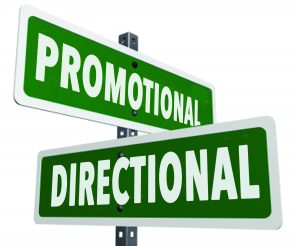Advertising is comprised of two primary media functions; Promotional and Directional. Simply put: Promotional Media is proactive advertising that reaches out to target markets with motivational messages. Directional Media is reactive, initiated by consumers shopping for those advertised products and services and looking for the best price and a place to buy.
What comes first the chicken or the egg? You can’t buy it if you don’t know it exists. How could you Google “My Pillow”, if you had not seen Mike Lindell advertising it on a TV commercial? Or, would you even consider buying a new pillow at all if the commercial had not promoted the idea of a better pillow? So first, the marketer must reach the potential buyer with Promotional Advertising. Only then, can the shopper seek out where to buy the product or service.
What is Promotional Media? It is any combination of print, broadcast, outdoor, on-line and special events advertising that reach target audiences to attract their attention, promote features and benefits, and motivate prospective buyers to respond. Their responses may be to further inquire about the features, the prices, or to take advantage of a special advertised promotional or discount offer. The promotional campaign can be any combination of print ads, catalogs, brochures and direct mail… broadcast which may be, TV or radio commercials… social media including, on-line ads, videos, and email … along with promotions like trade shows, demonstrations, point-of-purchase retail merchandising… an where applicable, packing and in-store displays. All these elements, in various combinations are designed to get exposure, generate brand awareness, establish credability, promote a corporate image, but most important generate sales.
A comprehensive promotional advertising campaign targets primary and secondary markets with a coordinated, multi-faceted, marketing strategy. Every product, service and company is unique, as markets are continually evolving. A marketing analysis by a Marketing Consultant will determine the most effective marketing strategy to meet the objectives, capabilities and budget of the marketer.
What is Directional Media? It is a resource that directs potential buyers to a product/service source for information and where to purchase. The original, and one of the most successful Directional Media sources was the Yellow Pages classified phone directory. For decades the “Find it fast in the Yellow Pages” slogan, promoted the use of the phone book as the single most effective source to locate local businesses. While all businesses were listed free, local advertisers bought display ads that promoted their businesses. The Display ads stood out on the page with graphics and information to attract and prompt buyers to call or visit. So, Promotional Advertising was first imbedded in Directional Media.
Today, it is all about the Internet. A Google search can locate a vast array of products and services, locally and internationally. Like the Yellow Pages, advertising is embedded and dominant at the beginning of the search. As in all Directional Media, the shopper must know what they are looking for, and the proper product nomenclature, in order to search for it or a specific company, by name. Early Yellow Pages studies revealed that 50% using the phone book knew who they were looking for. The other half were shopping by category. The same holds true today.
There are many forms of Directional Media, from the traditional print directories, to “where to buy it” dealer lists posted on line. Many Trade and even Consumer publications put out Buyer’s Guides listing product category and businesses alphabetically. The digital versions of these publications feature interactive links to the marketers’ webpages. Trade show programs and organizations distribute directories. The key to directional marketing strategy is to be where your customers may be looking for your product, or service, your company, or your competitor.
Working in Combination
Promotional advertising, PR, and sales promotion targets the market to get attention, generate awareness, create and capitalizes on a need or desire, then directs the potential buyer where to purchase. Searchers, seekers and surfers, flip through magazines, print catalogs, or surf the web to seek out specific products or to see what is available. As they peruse through the listings they may find what they are looking for, and/or run across something they hadn’t considered but are interested in.
Promotional and Directional marketing is relevant in retail shopping. You go to a store with the intent to purchase a specific item. As you enter you ask a clerk where that item can be found. They point out a specific isle… this is Directional Marketing. As you navigate to the target location you pass isles of products. While you had no intention of buying any of these, you are attracted to an item, perhaps you saw in a commercial or the display packaging got your attention. So, Promotional Advertising has influenced your buying decision.
Whether shopping on-line or at retail outlets, consumers are influenced by dynamic graphics that grab shoppers’ attention… informative copy that sells product features and benefits… and Brandname recognition that insures credibility. Sales can be gained or lost in the shopping phase, when buyers are swayed to a competitors’ product. This presents both a challenge and an opportunity for marketers. You have to aggressively promote to gain a competitive edge.
There is a factor that many marketers do not take full advantage of. It is, options and accessories. Shopping on Amazon you will see prompts, “Often bought together,” with options and accessories that complement your purchase. This concept is effective in all forms of advertising, collateral, and sales promotion. Offering accessories, add-ons and options will dramatically increase the bottom line on sales.
In summary: Promotional Advertising attracts the market to the product or service through advertising, and Directional advertising lets them know where to buy it. To assure an effective marketing strategy a comprehensive Marketing Analysis by an experienced Marketing Consultant is recommended.

